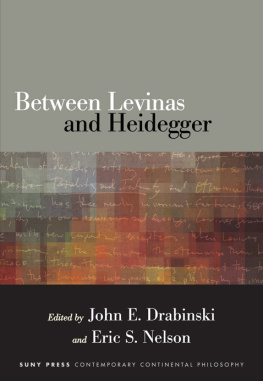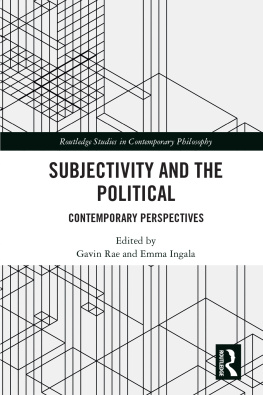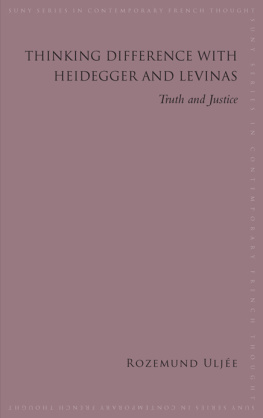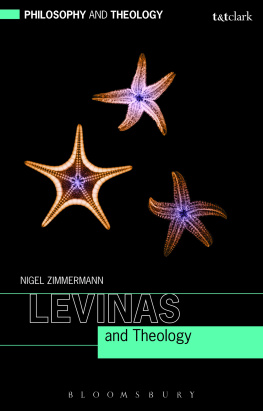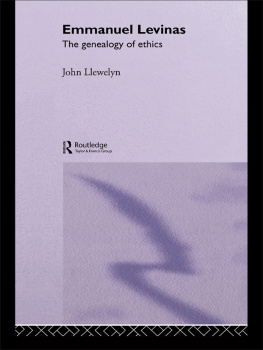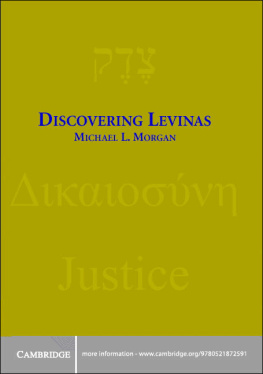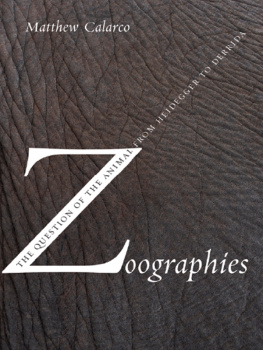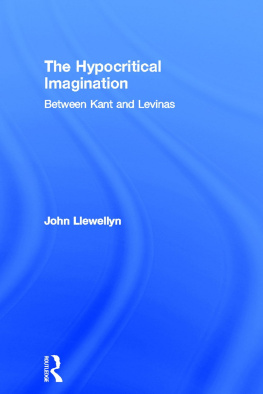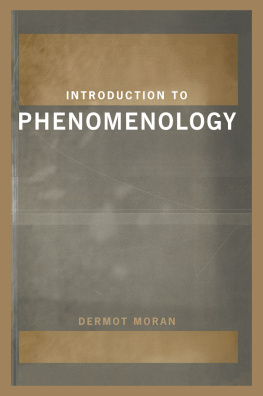BETWEEN LEVINAS
AND HEIDEGGER
SUNY series in Contemporary Continental Philosophy
Dennis J. Schmidt, editor
BETWEEN LEVINAS
AND HEIDEGGER
Edited by
JOHN E. DRABINSKI
and
ERIC S. NELSON
S TATE U NIVERSITY OF N EW Y ORK P RESS
Published by
S TATE U NIVERSITY OF N EW Y ORK P RESS , A LBANY
2014 State University of New York
All rights reserved
Printed in the United States of America
No part of this book may be used or reproduced in any manner whatsoever without written permission. No part of this book may be stored in a retrieval system or transmitted in any form or by any means including electronic, electrostatic, magnetic tape, mechanical, photocopying, recording, or otherwise without the prior permission in writing of the publisher.
For information, contact
State University of New York Press, Albany, NY
www.sunypress.edu
Production, Laurie D. Searl
Marketing, Anne M. Valentine
Library of Congress Cataloging-in-Publication Data
Between Levinas and Heidegger / edited by John E. Drabinski and Eric S. Nelson.
pages cm. (SUNY series in contemporary continental philosophy)
Includes bibliographical references and index.
ISBN 978-1-4384-5257-9 (hardcover : alk. paper)
1. Lvinas, Emmanuel. 2. Heidegger, Martin, 18891976. 3. Ontology. 4. Ethics. I. Drabinski, John E., 1968 II. Nelson, Eric Sean.
| B2430.L484B48 2014 |
| 194dc23 | 2013033746 |
10 9 8 7 6 5 4 3 2 1
CONTENTS
John E. Drabinski and Eric S. Nelson
PART I
IMMANENCE AND TRANSCENDENCE
Ann Murphy
Philip J. Maloney
Eric S. Nelson
PART II
TEMPORALITIES
Didier Franck, Translated by Robert Vallier
Emilia Angelova
Simon Critchley
PART III
SUBJECTIVITIES
Franoise Dastur
Robert Bernasconi
Franois Raffoul
PART IV
OTHER OTHERS
Peter E. Gordon
Krzysztof Ziarek
John E. Drabinski
INTRODUCTION
John E. Drabinski and Eric S. Nelson
It is only then that the relation to exteriority would no longer catch its breath. The metaphysics of the face therefore encloses the thought of Being, presupposing the difference between Being and the existent at the same time as it stifles it.
Derrida, Violence and Metaphysics
REVISITING THE QUESTION OF LEVINAS AND HEIDEGGER
Who is Heidegger to Levinas? Who is Levinas to Heidegger? What would it mean to think between ontology and ethics, between the history of Being and the beyond Being? What sorts of issues emerge at these crossroads, and what do those issues have to say about the beginnings and ends of philosophy?
The chapters collected here engage these sorts of questions in pursuit of another kind of relation between Levinas and Heidegger. To be sure, much has been written of this relationship, especially from the perspective of Levinasians concerned with the historical and philosophical roots of ethics as first philosophy. Levinass texts offer numerous examples of critique, and perhaps as a result, commentary has oftenmaybe too oftenadopted Levinass polemical tone. Levinass reading of Heidegger is never especially subtle or restrained. And Heidegger scholarsHeidegger of course did not write on Levinashave not been especially enthusiastic or especially interested in Levinass claim to have subverted and overcome fundamental ontology. At first glance, the Levinas-Heidegger relation appears stalled and, at best, wholly one-sided. But what would it mean to pursue this relation beyond the limits of textual evidence or mere polemic? Another kind of relation; what is the philosophical meaning and even possible promise of this relation?
A cluster of articles by Levinas from the early 1930s in the same spirit appeared, praising the new German philosophical movement with special emphasis on Heideggers intervention. At this point, one already sees the problematic of transcendence in Levinass work, and so the story goes, this problematic is largely Heideggerian in character and orientation.
But there is a decisive interruption. Levinass account of transcendence shifts, with enormous philosophical consequences, from the ecstatic structure of subjectivity toward what becomes a language of alterity. Levinas begins to become Levinas, and ethical life moves to the center of his philosophical work. Now, whether that interruption consists of an encounter with other texts and ideas (namely, Rosenzweig and other Jewish thinkers, sacred texts, or even the Kierkegaard revival and Jean Wahl) or derives from outrage at the Heidegger scandal of 193334 is a matter of important debate. Levinas scholars have been attentivewhile never in wholehearted agreementto the nuances of these shifts in emphasis and the fundamental interruption of Levinass relationship to the Heideggerian transformation of phenomenology. The shift and interruption are famously characterized by Levinas as leaving the climate of Heideggers work. The obvious question is then: how are we to understand the relationship of a post-Heideggerian thinkingthat is, a Levinasian thinkingto Heideggers enormous contribution to such a post? Indeed, leaving the climate proves more complicated than simply beginning anew; there is always still the trace of Heidegger in the departure from and critique of his work. Levinas will never characterize his work as before or in any way straightforwardly prior to the Heideggerian revolution. Levinas thinks after Heidegger. In this regard, it is worth quoting in full how Levinas articulates this break in From Existence to Existents (1947), where he writes: If at the beginning our reflections are in large measure inspired by the philosophy of Martin Heidegger, where we find the concept of ontology and of the relationship which man sustains with Being, they are also governed by a profound need to leave the climate of that philosophy, and by the conviction that we cannot leave it for a philosophy that would be pre-Heideggerian. critical of Heidegger, often delivered as short polemics and spanning nearly five decades. We have to take this passage seriously, however, if for no other reason than for the fact that Levinas makes it impossible to pose his break with Heidegger as simple dismissal or refusal: we cannot leave it for a philosophy that would be pre-Heideggerian.
Even though Levinass critique of Heidegger reaches across a handful of decades, sitting at the center of so many pivotal passages from Totality and Infinity and Otherwise than Being , his critique has three nearly invariant features. First, Levinas, by his own admission and design, generally limits his critical commentary on Heidegger to Being and Time with a few important exceptions. When Levinas articulates the primacy of the Infinite, the otherwise than being, or the tracethose three movements against the transcendence of Being that Levinas interprets as a philosophy of immanence and totalityhis primary opposition is to Heideggers early project of fundamental ontology. Although Levinas does take up aspects of Heideggers later thought, such as the issue of ontotheology, in later works, the matter of Heideggers later thought, which emphasizes the withdrawal of Being and a very different notion of human existence, is mostly left for us to explore. Second, Levinas works with a very simple characterization of Heideggers work, namely, that it is a reflection of the philosophy of totality inherent, with very few exceptions, in the destiny of the West. Even though they appear to have radically different concerns, being and ethics, both critique the history of Western philosophy as a forgetful and neglectful whole. Further, despite his apparent enthusiasm for Heideggers work in The Theory of Intuition , Levinas quickly grows suspicious of ontology as a form of thinking totality. Surely, for better or worse, Levinas cannot but hint at the link between fundamental ontology and the scandal of 193334. And so, third, beginning with his philosophical and political writings of the 1930s, Levinas is concerned with the connections between Heideggers thought and National Socialism. The refusal to read or take seriously Heideggers work after Being and Time gives a certain polemical intensity to Levinass work, but also, as this volume notes in many chapters, leads one to wonder if Heideggers work might bear unexpected parallels or intersections with Levinass experiments with the language of alterity.

